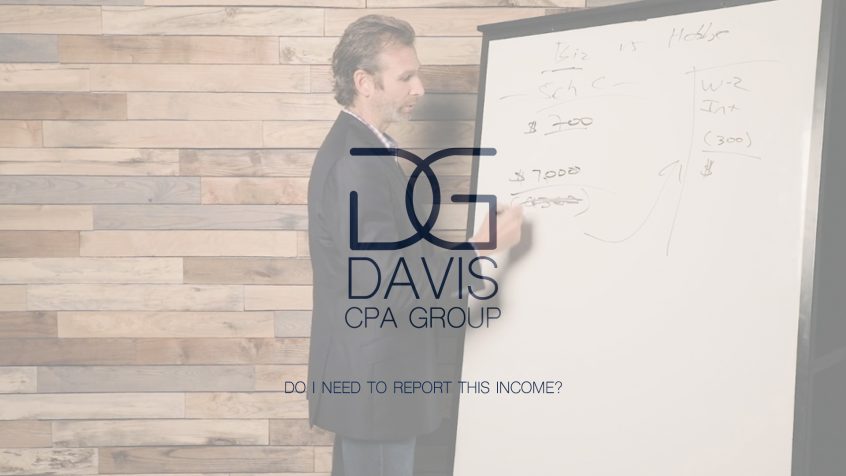Hi, Brandon Davis with Davis CPA Group. The one thing that I get hit with sometimes when I talk to my clients or even out and about is, do I need to file a tax return? Or do I need to report this income from a business? And sometimes it’s a situation where is this really a business or is this a hobby or to somewhere in between? And so, some people may have a job and they do things and they may have an opportunity to kind of freelance and do some things on the side. And so let’s talk through a little bit about what that looks like and what you should be doing.
I guess today is going to be about business versus hobby and kind of what that looks at. And so say for example, that you take photographs of stuff and so you have a job where you take photos, and people see you doing that job for your employer or what have you and they say, “Hey I can see you’re pretty good with a camera and I got some events coming up and I’d like for you to take some pictures of my event or of my kids or whatever.” And you’re like, “You know what? I can do that.” And so you take your own equipment over there, you snap a few pics because you love taking pictures. You take pictures all the time and they pay you a few bucks to do it.
Well, it may not be a business necessarily because it’s not like something you’re shutting everything else down, you’re pursuing in your whole life. But it could be a kind of a side hustle or a side business or a hobby and so there are things to consider relative to doing that. The IRS basically says that you’re supposed to report gross receipts from all sources and generally speaking on a business side, if you gross more than $600, you’re supposed to report that $600 on what’s called a form schedule C as part of your personal tax return. And a schedule C is basically the self-employed schedule of a tax return, but it also can be used to pick up hobby income.
Now, the thing about hobbies though is hobbies you can only deduct your losses to the extent of your income. For example, if this is a hobby and not really in business and I get paid, say I get paid 600 bucks or 700 bucks, but I’ve got, $400 worth of camera stuff I buy every year and I’m going to have my mileage to go take these pictures and maybe some supplies and I could come up with a $1,000 worth of expenses. Well, that’d be a $300 loss. Well, if it was a business, I could take that $300 loss. Let’s just do this. Let’s walk through this.
Say we made 700 bucks in revenue with all of our expenses and equipment and such. We’ve got $1,000 in expenses. And so I got a $300 loss. If it’s a business and I want to treat it as a business and I put it on my tax return, I’d throw it on the Schedule C, this $300 loss would come over here and say I’ve got other sources of income, I’ve got W2 wages, I’ve got interest income or whatever. This loss could come over here and help offset some of that income and reduce your tax liability. That happens sometimes. You’re allowed to take losses if they’re legitimately used to create income and you have a longterm profit motive for your business. It’s okay to lose money occasionally because that’s just the way it is, particularly when you first start.
Now the other scenario says, well I don’t know that I could say this is a business because they don’t do it that much. I don’t really keep very good records and I just put the money in my pocket and so maybe it’s a hobby. Well, if it’s a hobby, then we don’t get to do this part. We still probably should file the schedule C, pick up the 700 bucks. We limit it to $700 in expenses and we just have this, no deduction over here against your other income. But it’s like, it’s $700. It’s not terribly material and I know I have more expenses to cover that. Then so I’ve got some clients or some people that will take the position from a risk standpoint if the IRS were to audit me and they see this extra 700 bucks, where’d this come from? You say, “Well I do some shooting on the side.” And then they’re, “Well, did you report the income?” “Well, I didn’t really. And here’s why, because I have all these expenses.”
And the IRS says, “You know what? That makes sense, you have income and expenses 700 bucks.” They’re not going to get too excited about that. It kind of goes back to the facts and circumstances of what you’re trying to do. If it’s something you want to make a business and you want to push it and you want to go and you want to make a profit motive behind to say, “My goal is to make money and not just keep showing losses,” then yeah, maybe you look at doing it and showing it as a business, put it on a schedule C. But if it’s truly a hobby or if it’s something you just kind of do on the side, is a little side hustle for some pocket change and kind of helping support something you’re passionate about, then I’d say it’s a hobby. And whether you choose to file or not is something you should look on an annual basis.
If you generate $2,000 and someone gives you a 1099 because you shot their business event or whatever, well now we got to filing requirement because we got at least something that got sent to the IRS that says, “Hey we got money.” And then we want to put our expenses here and file something. But by and large, if it’s truly a hobby situation or something that you do kind of freelance or on the side, a lot of times you can just make sure you keep records of it. You don’t want to just ignore it, but make sure that you have income and expenses. And if those expenses are outweighing that income, you could probably not worry about filing anything. But by and large, if it’s a business, this is how you need to file it and this is how you need to treat it. I hope that clears up some of those questions for people that have out there, but that’s something I wanted to tackle in this video.


